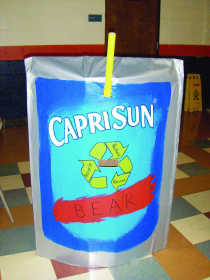Bainbridge Elementary flips trash into cash

BAINBRIDGE-- A few years ago Bainbridge Elemantary teacher Kristie Hankins applied for a Target field trip grant. She thought it would be a nice chance for the kids to take a field trip and learn about something new, so when it was awarded she decided to bring them to the Twin Bridges landfill in Danville.
What they saw, she said, were trucks driving in and dumping a shocking amount of recyclable material. Tour directors told her that within 15 years the facility would be full. Save for a possible park, the huge area of land would soon be useless.
"After we had that eye-opening experience, we came back to Bainbridge Elementary and said, 'What can we do to reduce our waste?'" Hankins said. "We realized if we can slow that process down, maybe instead of it lasting 15 years before they need a new facility, maybe it will last 30 years."
Hankins helped create numerous recycling efforts within the school, which has, improbably, become a profitable endeavor.
"We call it 'Trash into Cash,'" Hankins said. "We have worked really hard where we are recycling, and in that we were reducing our garbage hauling cost and bringing in extra funds."
Since November 2009 the school has cut garbage hauling costs in half, saving the school $10,448.
Their recycling and reducing efforts span to every aspect of the school.
They've collected 66 tons of paper since 2007 and last year donated 200,000 pop tabs.
Maintenance staff brings cardboard and plastics to the large recycling dumpster in town that has been provided by West Central Solid Waste.
"Jane Collisi (WCSW) has really helped us here in continuing our recycling efforts," Hankins said. "I hope she gets some credit."
They have also partnered with a number of national businesses that focus on recycling, including TerraCycle and Staples.
TerraCycle helps to eliminate waste by creating national recycling systems for previously non-recyclable or hard-to-recycle waste, such as writing instruments, drink pouches and chip bags.
Schools collect these items then TerraCycle pays to have them shipped and gives the school cash.
The most prominent source has been the Writing Instrument Brigade. TerraCycle collects used pens, markers and pencils, then converts them into benches, recycling bins and other items.
Bainbridge was recently named one of the top 100 collectors in America, having brought in more than 4,000 since last year.
The school has also given TerraCycle drink pouches (50,000), tape dispensers (500), candy wrappers (700), glue sticks and bottles (3,000), chip bags (13,000), and Lunchables (35,000).
Items that cannot be recycled are "upcycled" into new items like bag and picture frames.
TerraCycle has given Bainbridge Elementary about $2,000 since they began collecting last year.
Hankins also learned she can return used ink cartridges to Staples at $2 each. This seems like a small total but the school has already collected 2,000.
Staples limits the returns to 10 per person per month, but Hankins uses a teacher from every class to surpass that quota. As a result each classroom gets $40 worth of paper, ink and other supplies from Staples every month.
The school has a contest every couple months. The class to bring in the most empty cartridges wins a popcorn or ice cream party.
Bainbridge also participates in Putnam RISE (Renewal, Investment, Savings and Efficiency), which rewards schools for limiting their energy costs, most notably, by having fewer lights on in the hallway.
Schools have needed to cut costs due to budget concerns, and Bainbridge Elementary has found a way to do that while they earn money and help the environment.
Hankins is the Green Team coordinator, a student organization that has been keeping up with all the initiatives, participating in community events and helping to educate the other students about recycling and the environment.
The school has posters and special recycling bins to help guide students what and where to recycle each item, and, Hankins said, there are occasional morning announcements to give recycling tips.
"We educate the kids so they can educate their parents," Hankins said. "If we can get these kids going home and saying, 'Mom, we need to recycle,' we might be able to make a change."
Just a few years ago the school had no funding for recycling. Participating teachers had to pay for the bins and costs themselves.
With hard work, it has become a self-sustaining and profitable endeavor.
The hope, Hankins said, is to make recycling second nature to the next generation.
"The students are really good about knowing what to recycle," Hankins said. "The teachers are getting better."
